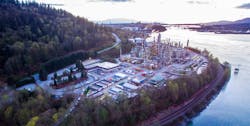Parkland pausing Burnaby refinery operations amid Trans Mountain pipeline shutdown
Calgary-based Parkland Corp. is pausing processing activities at subsidiary Parkland Refining (B.C.) Ltd.’s 55,000-b/d refinery on Burrard Inlet in North Burnaby, near North Vancouver, BC, amid feedstock supply disruptions caused by the ongoing shutdown of the 300,000-b/d Trans Mountain crude oil pipeline.
After initiating steps to halt refining operations on Nov. 22 following a mid-November shutdown of the Trans Mountain pipeline—the refinery’s primary source of crude feedstock—Parkland’s team is continuing work to pause processing activities and maintain the refinery in ready mode for its safe restart once sufficient crude supplies become available, Simon Scott, Parkland’s director of communications, told OGJ via e-mail on Nov. 24.
While a definitive timeframe for when the refinery might resume processing operations remains unavailable, Scott said Parkland is closely monitoring Trans Mountain’s progress to restart the pipeline.
Despite the pause in crude processing at Burnaby, Parkland said the refinery’s blending, shipping, terminal, and rack activities remain operational to enable available fuels to be offloaded from ships and rail directly into the site for storage and distribution across the lower mainland and Vancouver Island.
“Our teams are working tirelessly to source and import available refined fuels. By leveraging our supply capabilities and infrastructure at the refinery, we are confident in our ability to keep our retail and commercial locations supplied with fuel,” said Ryan Krogmeier, Parkland’s senior vice-president of supply, trading, and refining.
As of its latest official update on Nov. 23, Trans Mountain—which undertook a voluntary, precautionary shutdown on Nov. 14, 2021, in anticipation of heavy rainfall and extreme weather conditions in British Columbia—said it is optimistic it can restart the crude pipeline, in some capacity, by the end of the week if all planning and work continues to progress and no further issues are assessed (OGJ Online, Nov. 24, 2021).
Of the pipeline’s 300,000-b/d capacity, 221,000 b/d is allocated to refineries in BC and Washington State, with the remaining 79,000 b/d routed to Westridge marine terminal for export.
Refinery overview
The Burnaby refinery processes light and synthetic Canadian crudes such as Edmonton Par 80% and Syncrude 20% delivered via the Trans Mountain pipeline into gasoline, diesel, jet fuel, asphalt, heating fuel, heavy fuel oil, butane, and propane for distribution throughout British Columbia.
Parkland purchased the Burnaby refinery—which was the first in Canada to use existing infrastructure and equipment to coprocess biofeedstocks such as canola oil and oil derived from animal fats (tallow) alongside crude oil to produce low-carbon fuels— and related downstream assets from Chevron Canada Ltd. in 2017 (OGJ Online, Feb. 18, 2021; Apr. 20, 2017).
About the Author
Robert Brelsford
Downstream Editor
Robert Brelsford joined Oil & Gas Journal in October 2013 as downstream technology editor after 8 years as a crude oil price and news reporter on spot crude transactions at the US Gulf Coast, West Coast, Canadian, and Latin American markets. He holds a BA (2000) in English from Rice University and an MS (2003) in education and social policy from Northwestern University.

